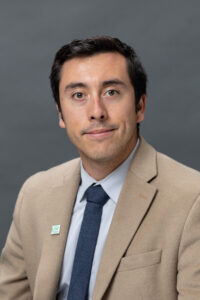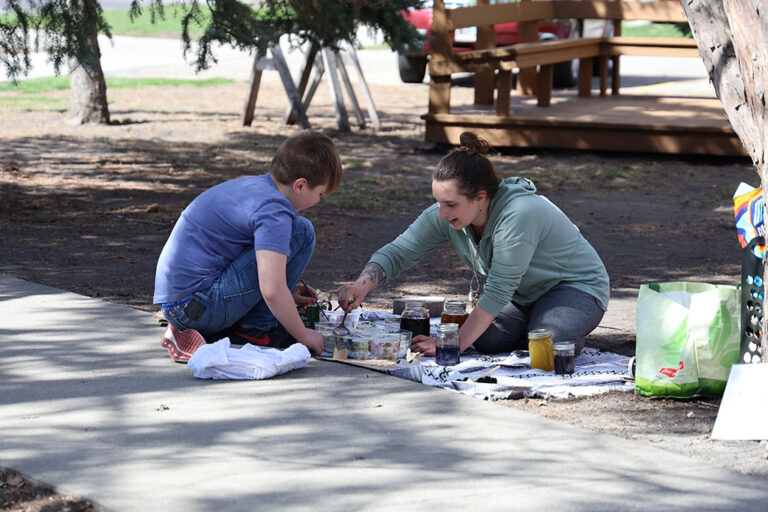The keys to compassionate leadership
UND Student Body president, VP say good leadership involves good listening and challenging one’s own beliefs

Ella Nelson and Connor Ferguson, UND’s student body president and vice president, respectively, visited the Memorial Union on Wednesday, Feb. 21, to offer insight into the importance of compassionate leadership.
The Student Government leaders’ speech was part of UND’s 18:83 Speaker Series, which features talks that take place each Wednesday afternoon at the Union’s Social Stairs. Speakers time their addresses to last about 18 minutes and 83 seconds, a number that coincides with the University’s founding year.
Both juniors, Nelson is a Biology major from Stillwater, Minn., and Ferguson an Information Systems major from Maple Grove, Minn. Although the pair had extensive experience in student government before assuming their current roles, they did not previously know each other.
Nelson said this initial unfamiliarity with each other’s leadership style helped them grow.
“It really forced us to consider these different perspectives and take into account the different groups and people on campus,” she said.
“There are many paths to leadership,” Ferguson added. “There’s no wrong way to approach it.”
Although Nelson said her leadership journey began with some setbacks, she persevered with the conviction that her leadership style serves others in a positive manner.
“I was told that I was too shy, needed to be more assertive, didn’t have the right personality and simply was not ready for it,” she said. “This is all pretty rough to hear, and discouraging when you hear these things from your peers, friends and family. However, these are not bad qualities to have and should not be seen as weak qualities. It’s important to be an empathetic and compassionate leader.”
Nelson said becoming a leader requires “taking that first step out of your comfort zone,” and committing to the process. She cited an anecdote from a recent trip to Bangkok as part of UND’s delegation to the Global Peace Summit as an example.
“Our tour guide was adamant that we try one of Thailand’s delicacies, which ended up being bugs,” she said. “I looked at it and said, ‘I’m definitely not doing this – this is not something I want to do, and out of my comfort zone.’ But one person in my group took that step, and it motivated us all to just try it.”
Nelson incorporated another lesson from her experience at the summit into her leadership philosophy – the importance of listening without judgment.
“When you think of compassion you think of kindness, which is very important, but it’s not the only part of being a compassionate leader,” she said. “It means to listen – not to reply and defend – but also to learn to understand. This is something that really stuck with me. When someone says something I don’t agree with, I’m going to want to defend my opinion. But it’s extremely important to look at your own opinion and see it not as the only picture, but just as a piece of the puzzle.”
Ferguson said the most important step for leaders to take is to find a way to get involved, no matter how insignificant it may seem on the surface. He read a quote from former President Theodore Roosevelt on the importance of acting as a leader:
“Get action. Do things; be sane; don’t fritter away your time; create, act, take a place wherever you are and be somebody.”
“This was a quote I heard in about eighth grade, and it has pushed me along from that point forward,” Ferguson said. “Anything you do is a stepping stone into leadership, and that’s the most important part of becoming a compassionate leader.”
Other guiding principles on leadership from Nelson and Ferguson:
- Let empathy be your guide.
- Build bridges – even with people with whom you strongly disagree.
- Social change only requires about 3.5% of the population to act.
- Become process-oriented; focusing on the outcome alone will lead to burnout.
- Employ patience, persistence and kindness to obtain the result you want. You don’t get what you want by screaming at people.
The 18:83 Speaker Series will continue at 2:30 p.m. Wednesday, March 28, with Brad Berry, head coach of UND’s hockey team.



